
Speaker Information
Michael Best - Assistant Professor
Sam Nunn School of International Affairs &School of Interactive Computing
Nancy Brockway - Chief Emergency Services Officer
American Red Cross
Amer Daoudi - Director
World Food Programme’s (WFP) Logistics Division
William R. (Ray) Doyle - Senior Research Scientist
Information Technology and Telecommunications Laboratory of the Georgia Tech Research Institute
Bob Emrey - Senior Research Scientist
Chief of the Health Systems Division
USAID Bureau for Global Health
David Gazashvili - Deputy Director and the Senior Advisor, Emergency and Humanitarian Assistance Unit
CARE USA
Nathaniel Hupert - Associate Professor of Public Health and Medicine
Cornell University and Director of the Preparedness Modeling Initiative for the U.S. Center for Disease Control and Preparedness (CDC)
William Hyde - Director of Operations and Knowledge Management
International Medical Corps
Michael Marx - Senior Civil Military Coordination Advisor
United Nations Office for the Coordination of Humanitarian Affairs
Leigh McCook - Division Chief, Socio-Technical Systems Division
GTRI
Becky McCorry - Manager, Disaster Operations Center
American Red Cross
Richard Owens - Vice President
John Snow Inc and The Partnership for Supply Chain Management
Rosemary Parnell - Director, Field Logistics
American Red Cross
Maria Rey - Executive Director
Center for Emerging Logistics and Supply Chains
Jim Shortal - Director
Business Continuity Engineering and Technical Operations Cox Communications
William "Eric" Smith - Assistant Administrator
FEMA Logistics Management Directorate
Dan Stowers - Planning Director
Georgia Emergency Management Agency (GEMA)
Bert Thornton - President of Franchise Operations
Waffle House
Rolando Tomasini - Research Group Leader
INSEAD Social Innovation Center's Humanitarian Research Group
Santosh Vempala - Professor and Director of the Algorithms and Randomness Center
Georgia Tech
Prashant Yadav - Professor of Supply Chain Management
Zaragoza Logistics Center

Michael Best
Dr. Michael L. Best is assistant professor at the Sam Nunn School of International Affairs and the School of Interactive Computing at Georgia Institute of Technology where he is a research director with their GVU Center. He is also a Fellow of the Berkman Center for Internet & Society at Harvard University. Professor Best is co-founder and Editor-in-Chief of /Information Technologies and International Development/. He is a frequent consultant to the World Bank, ITU, and USAID. He holds a Ph.D. from MIT and has served as Director of Media Lab Asia in India and head of the eDevelopment group at the MIT Media Lab.
Best's research focuses on information and communication technologies (ICTs) for social, economic, and political development. In particular he studies mobile and Internet-enabled services and their design, impact, and importance within low-income countries of Africa and Asia. He researches engineering, public policy, and business issues as well as methods to assess and evaluate development outcomes. Professor Best is also interested in the impact of ICTs on the development-security nexus and on post-conflict reconstruction and reconciliation.

Nancy Brockway
Nancy Brockway was named Chief Emergency Services Officer for the American Red Cross, Metropolitan Atlanta Chapter in 2003. Previously, she was the chapter’s Director of Disaster Services. In addition to her local disaster responsibilities, Ms. Brockway serves as an advanced level disaster instructor, is a member of the National Critical Response Team and the International Response Team, and is a Level IV Disaster Relief Operation Director in the National Disaster Services Human Resource System. She has served on a number of disaster relief assignments around the country, including Director of the Red Cross relief operation for the World Trade Center Operation in New Jersey after 9-11 and Hurricane Katrina Relief Operations in GA in 2005.
Ms. Brockway started with the Red Cross as a volunteer CPR and First Aid instructor in 1982. In 1983, she joined the paid staff of the chapter as Director of the Office of Volunteers. In 1986, she was appointed Director of the Red Cross Service Center serving DeKalb and Rockdale counties.
In 1993, Ms. Brockway was "loaned" to the Atlanta Committee for the Olympic Games. There she served for three years as Program Manager in the Medical Services Department with responsibility for coordinating the medical care for all 11 million spectators, staff and Olympic family members at the 1996 Olympic Games. She was also responsible for the recruitment, placement, and training of 4000 medical volunteers. After completing her assignment, she returned to the chapter to assume the position of Director of Disaster Services. In 2003, she was promoted to the position of Chief Emergency Services Officer.
Ms. Brockway is a native of Baton Rouge and a graduate of Louisiana State University. She is an active member of St. Anne’s Episcopal Church. She is a founder and vice-president of Kids4Peace, USA, a faith-based non-profit organization that brings Israeli, Palestinian and American children together in a year long education for peace program.
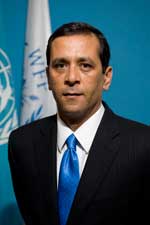
Amer Daoudi
As the Director of the World Food Programme’s (WFP) Logistics Division, Mr. Daoudi is responsible for the supply chain operations of the world’s largest humanitarian agency. On an annual basis, the division is responsible for bringing assistance to more than 86 million beneficiaries by procuring and delivering over 5 million metric tonnes of food. Furthermore, as Chair of the Global Logistics Cluster, Mr. Daoudi oversees the responsibilities of WFP to facilitate the logistics response of the humanitarian community as a whole, in both sudden and on-going emergencies.
Mr. Daoudi, who began his World Food Programme career in Sudan in 1994, is no stranger to the emergencies that affect the world’s hungry people and the challenges that come with reaching beneficiaries in remote and war-torn corners of the world. After serving four years in Sudan as Head of Logistics, Mr. Daoudi was subsequently transferred to Ethiopia in 1998 as the Regional Logistics Coordinator for both Ethiopia and Djibouti which was the largest WFP operation at that time.
Although assigned as the Regional Logistics Officer for East, Central and Southern Africa Bureau from 2001 to 2003, large scale emergencies pulled him to all corners of the world to manage emergency logistics operations for the World Food Programme. These included:
- Establishing and managing a logistical network in war torn Afghanistan from 2001/2002;
- Building a multi-country logistical network to provide food to drought stricken and HIV/AIDS affected populations of Southern Africa Region;
- Managing the supply chain to feed 27 million Iraqis in 2003 immediately following initial hostilities. Deliveries exceeded 500,000 metric tons per month or some 27,000 truck loads per month through various corridors, often in very insecure conditions.
During Mr. Daoudi’s tenure at WFP, he has also led emergency operations in response to the Tsunami, the crisis in Darfur, Hurricane Katrina, the South East Asian Earthquake (Pakistan) as well as the conflict in Lebanon in 2006. Mr. Daoudi’s experience has proven that better response to emergencies is driven by enhanced logistics systems, optimal preparedness and broad partnerships. Over the last two years Mr. Daoudi and his team have facilitated the logistics response of the humanitarian community in sixteen sudden emergencies, and seven on-going crises. Their success stems from a focus on building capacity through the development of new inter-agency training programmes with the non- UN community; sharing of logistical best practices, augmented by an enhanced network of depots strategically placed throughout the world, on behalf of the humanitarian community. These are supported by innovative techniques for improving logistical systems in partnership with the humanitarian community. In his current position, Mr. Daoudi oversees over 2,500 national and international logistical staff, working both in WFP’s field operations and in its headquarters.
Prior to joining the World Food Programme, Mr. Daoudi worked for ten years in the commercial shipping and freight forwarding industry.

William R. (Ray) Doyle
William R. (Ray) Doyle is a Senior Research Scientist in the Information Technology and Telecommunications Laboratory of the Georgia Tech Research Institute (GTRI). Doyle is currently responsible for a number of homeland security projects for the Georgia Emergency Management Agency – Office of Homeland Security, including those in the areas of strategic planning, training, and exercises.
In addition to the work above, Doyle has performed research on a dry solar latrine for use in areas unsuited for traditional pit latrines. As a part of this project, he was a member of a GTRI/Emory team that traveled to La Paz, Bolivia, in 2007, where two experimental latrines were built with the assistance of a group of students and a local NGO. Suitability testing for these latrines is still underway. Also, following Hurricane Katrina, Doyle was part of a GTRI team that traveled to the Gulf Coast on several occasions to provide construction safety training to the influx of unskilled workers who came to the area to take part in rebuilding after the storm.
Along with his work at GTRI, Doyle has spent more than 20 years as a consultant to the US EPA. In this role, he has managed emergency response and remedial assessment/action contracts in Regions 4, 5, and 10 and provided technical support for similar projects in Regions 1, 3, and 6. Through these contracts, his team of scientists and engineers responded to numerous chemical and oil spills associated with transportation and industrial incidents across the country. Outside of routine spills and fires, his teams’ responses on behalf of EPA included events of national importance such as Hurricane Andrew, Tropical Storm Alberto, the anthrax and WTC attacks of September 2001, and the Shuttle Columbia disaster.
Mr. Doyle received his B.A. and M.S. in biology from the University of Louisville, and is a P.O.S.T. certified trainer in drug enforcement. He teaches aspects of clandestine drug laboratory response to law enforcement personnel at the Georgia Public Safety Training Center and has presented papers on methamphetamine and its hazards to first responders and other groups impacted by the manufacture of this illegal substance.
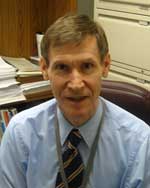
Bob Emrey
Bob Emrey is Chief, Health Systems Division, in the Office of Health, Infectious Diseases, and Nutrition, Bureau for Global Health, at USAID headquarters. He leads a team addressing issues in health financing, human resources, quality assurance, management of pharmaceuticals, and information systems for management, evaluation, and planning. He is USAID?s alternate member of the Health Metrics Network Board and represents USAID on the steering group of the Learning Network on Program-Based Approaches (LENPA).
Previously he served as health management and finance advisor to USAID?s Health Office, managing the USAID program in health financing and management, including the Health Financing and Sustainability (HFS) project, Latin America Health and Nutrition Sustainability (LAC/HNS) project, and the Partners for Health Reform (PHR) project. Before joining USAID, he* s*erved as consultant advisor to various other USAID and World Bank basic health services programs in the areas of strategic planning, management, and financial reform. He also served for four years as founding director of international programs for the Association of University Programs in Health Administration, Washington, D.C. He began his public health career as Commissioned Officer in the U.S. Public Health Service, serving in the Indian Health program at headquarters and as Service Unit and Hospital Director at Crow-Northern Cheyenne Service Unit, Montana.
Bob was born in Charlevoix, Michigan. He was raised in southern California, and he holds a Bachelor?s degree in economics from Occidental College, a Master of Business Administration degree from UCLA, a Master of Public Health degree from UC Berkeley, and completed all coursework for a Ph.D. (ABD) in public administration from University of California, Irvine.
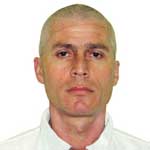
David Gazashvili
David Gazashvili is the Deputy Director and the Senior Advisor for Emergency Preparedness for the Emergency and Humanitarian Assistance Unit of CARE USA.
David has over nineteen years of management experience (including eleven years with CARE) in Georgia, Albania, Armenia, Azerbaijan, United States, Sudan, and Haiti in the fields of emergency response, infrastructure rehabilitation, sustainable livelihoods, community mobilization, small business development, and information technology.
David holds MBA degree with concentration on International Business from Monterey Institute of International Studies, Monterey, California, and University Degree in Civil Engineering, Concentration on Water Supply and Sanitation from Georgian Technical University, Tbilisi, Georgia.
Nathaniel Hupert
Nathaniel Hupert is an Associate Professor of Public Health and Medicine at Cornell University's Weill Medical College and Associate Attending Physician at NewYork-Presbyterian Hospital, and is the Director of the new Preparedness Modeling Initiative for the U.S. Center for Disease Control and Preparedness (CDC). Since 2000, he has led a number of Federally-funded projects to develop improved tools and logistics for mass prophylaxis, bioterrorism response, and health system preparedness for surge capacity. His research team’s models are available on the web sites of the U.S. Department of Health and Human Services (DHHS) and American Hospital Association and are used by states across the U.S. for preparedness planning. One of three academic researchers to serve on the Anthrax Modeling Working Group of the DHHS Secretary’s Council on Public Health Emergency Preparedness, he has lectured and given satellite and web broadcasts for the Agency for Healthcare Research and Quality and the CDC on mass prophylaxis and the physicians’ role in bioterrorism response. Dr. Hupert is co-Director of Cornell's Institute for Disease and Disaster Preparedness, whose mission is to advance the field of computational public health by applying engineering approaches to a range of public health response logistics problems ranging from U.S. emergency preparedness to scale-up of HIV/AIDS prevention and treatment in sub-Saharan Africa.

Bill Hyde
Mr. Hyde spent the last three decades managing conflict, post-conflict and development operations from both a headquarters and a field perspective. He has led professional teams in assessment and analysis, development, logistics and dispatch, support, correction and closure in over fifty countries. He served respectively in the United States Peace Corps and the United Nations High Commissioner for Refugees before initiating a two decade career with the International Organization for Migration. Within IOM Mr. Hyde was instrumental in developing the organization’s Emergency Response Unit, the Staff Security Unit and the Staff Development and Training Unit. He was the author, coauthor or contributor to various institutional training manuals including the Emergency Operations Manual, the Project Development Handbook and the Project Management Handbook. He helped develop demobilization, return and reintegration programs in several countries including Mozambique, Angola and Aceh (Indonesia). On loan to the Organization for Security and Cooperation in Europe (OSCE) he helped develop then managed the first overseas voting program for Bosnia and Herzegovina. From December 2004 through early 2006 he served as the IOM Coordinator, Tsunami Emergency Response Program, addressing the natural disasters in Indonesia. Mr. Hyde currently serves as Director of Operations and Knowledge Management for the International Medical Corps (IMC) and as a program coordinator / instructor with the Monterey Institute of International Studies (MIIS). Mr. Hyde lives in the Washington DC metropolitan area.
Michael Marx

Michael Marx is currently the Senior Civil-Military Coordination Advisor for the United Nations’ Office for the Coordination of Humanitarian Affairs (UN/OCHA) at the UN Headquarters in New York. Prior to this position, he was based in Geneva, Switzerland where he served as the Chief of the Civil-Military Coordination Section (CMCS) in UN/OCHA in Geneva. OCHA’s Civil-Military Coordination Section is mandated to facilitate and coordinate the access to and use of international Military and Civil Defence Assets (MCDA) in countries hit by humanitarian emergencies. For this purpose, it serves as the UN focal point for governments, international organizations and military and civil defence establishments for the employment of these assets in humanitarian situations.
Michael joined the UN after more than two decades working within the US Government, including serving as the Division Director for the Disaster Response and Mitigation Division in the Office of US Foreign Disaster Assistance at the US Agency for International Development (USAID/OFDA). While in OFDA he served in various disaster response assignments, including Disaster Response Team Leader; Africa Team Leader; DART Team Leader (Disaster Assistance and Response Team) in Iraq, Afghanistan, Ethiopia, and Mozambique; as well as the Response Manager for the US Government’s assistance to numerous crises, including the Asia Tsunami in 2004 and the Pakistan Earthquake in 2005.
Mr. Marx is also a former US Army Officer, whose tours included Asia, Europe, and Africa. While in the Army, he participated in several support operations to international disaster responses, including operations in Asia, Africa, and Latin America and the Caribbean.
Leigh Fitzpatrick McCook
Ms. McCook is the Division Chief of the Socio-Technical Systems Division within the Information Technology and Telecommunications Laboratory at GTRI. Her expertise includes technology transfer, outreach, planning, and program management. Ms. McCook currently serves as Program Manager for state Homeland Security/Emergency Response programs at Georgia Tech Research Institute. In this capacity, she is responsible for activities ranging from outreach, training, exercises, planning, technology development and integration, and policy. She works closely with the State of Georgia in capacities of homeland security and emergency response, including building stakeholder consensus, developing regional response plans and enhancement plans for the State, and designing and implementing exercise and training programs. She has also served as Associate Director of Center for Emergency Response Technology Instruction and Policy. In this capacity she was charged with building consortiums of academia, government, and NGOs to support research and technology transfer activities.
Becky McCorry

Becky McCorry, MS has been with the American Red Cross since 1995. She was the Emergency Services Director for the Greater Rochester Chapter in Rochester New York along with the lead for disaster for all the chapters within New York State. In February 2005, Becky joined the National Headquarters staff as the Manager of the Disaster Operations Center. Her role is to manage ongoing professional relationships and information interchanges with internal and external partners who are interested in disaster statistics and data analysis as well as providing the leadership guidance for all disaster relief operations nationwide. This management responsibility includes the following key elements:
- Providing management oversight to program including staff, budget, and execution of unit objectives
- Supervising assigned professional and support staff in the areas of information management, data management, and operations
- Authorizing and coordinating the assignment of national material and human resources to disaster relief operations
- Identifying and developing human resources to serve as disaster relief operations directors
- Maintaining a 24/7 on call link between National Headquarters, Service Areas, chapters, and partner federal agencies
- Providing oversight and direction in the Disaster Operations Center for the execution of daily activities and operational readiness of the facility and the alternative site
Becky has also another 20 years of management in various human service agencies in Rochester. She holds a BS in Health Education and an MS in Counseling.

Rosemary Parnell
Rosemary Parnell is the Director of Field Logistics for the American Red Cross. In this capacity, she is responsible for procuring, storing, handling, delivery and distribution of goods and services on national disaster relief operations. She also manages the fleet of approximately 320 emergency response vehicles and accepts in-kind donations on behalf of the American Red Cross.
Prior to the American Red Cross, Ms. Parnell served as the senior logistics officer for the United Nations World Food Programme, where she managed logistics in Uganda, Senegal, Rome, Niger, Sierra Leone, Kosovo, Serbia, Macedonia and Rwanda. Ms. Parnell also worked for the French Army, Navy and Air Force in Paris and the US Navy and Marine Corps in Washington and San Diego as a subject matter expert in acquisition logistics.

Richard Owens
Richard C. Owens Jr., a Vice President of John Snow, Inc., has more than 36 years of experience in public health management, focusing on logistics and supply chain management, information technology and health planning. International clients include ministries of health, family planning and HIV/AIDS programs, and nongovernmental organizations. He currently serves as project director for PEPFAR’s Supply Chain Management System (SCMS) project, which he has led since its inception in 2005. Before SCMS, he served for some 20 years as the project director for JSI’s DELIVER and Family Planning Logistics Management projects. Domestic clients include family planning programs, state health departments and commercial firms. Assignments have included direct technical assistance, training for large and small groups, and teaching at universities. His project management experience includes proposal development, planning, and technical and administrative oversight of projects with 3 or 4 to more than 300 staff members.

Maria Rey
Maria Ray is an educator and consultant on supply chain management and logistics strategies for emerging economies, and is a recognized expert in the fields of corporate performance management and the design of global and emerging supply chain strategies.
Maria Rey is founder and Executive Director of the Atlanta-based Center for Emerging Logistics and Supply Chains, which conducts over 100 logistics courses in 16 countries in the Americas and other emerging economies such as Turkey, Russia and Poland. She is also adjunct faculty at the Georgia Institute of Technology in the Executive Masters in International Logistics (EMIL) and Cranfield University where she teaches International Operations, Latin American logistics and design of performance management systems.
As supply chain management advisor, Maria has a strong practice focused on advising senior executives in the areas of supply systems strategy and high performing organizations. Her clients span many industries including government, manufacturers, distributors, financial service companies, and logistics service providers.
Maria is a regular speaker at The Council of Supply Chain Management Professionals (CSCMP), The Supply Chain and Logistics Institute, WERC, and ExpoLogistica Panama, Peru and Mexico. She has also keynoted numerous corporate conferences including, The Logistics Congress of the Americas, the Humanitarian Logistics Conference, the Hewlett Packard Summer Executive Series, the Coca-Cola Annual Supply-Chain Conference, and the Brazilian Association of Material and Logistics Managers (ABML). She is fluent, and lectures in English, Spanish, and Portuguese.
She is an Economist from Universidad del Rosario in Colombia, with a MSc in International Logistics and Operations from the Georgia Institute of Technology and currently conducting her doctoral research at Cranfield University in England.

Jim Shortal
Jim Shortal is the Director of Business Continuity for Cox Communications, a leading provider of cable TV, high speed internet and telephone services operating in fifteen states. In his role, Jim works closely with the local operating groups to develop and refine business continuity and emergency operations plans, develop and deliver training and plan exercises, and coordinate response activities during any type of emergency situation. He also works closely on collaboration initiatives with local, state and federal agencies to promote efficient emergency response capabilities.
Prior to Cox, Jim served as the Director of Crisis Management and Business Continuity at The Home Depot, with responsibility for all home offices, distribution centers and stores throughout the U.S., as well as support of International operations. He has also held management positions with Wal-Mart ISD in International IT infrastructure, Data Center Facilities Management, and IT Disaster Recovery.
Jim began his career with IBM in Corpus Christi, TX, in 1983, and has held numerous positions in information systems, disaster recovery and business continuity during his career, including managing a network of computer disaster recovery hotsites, and serving as a business continuity planning consultant.
He has been a speaker at numerous industry events on business continuity, emergency management, and disaster collaboration between the public and private sector. This includes the National Emergency Management Association, many state Emergency Management and Homeland Security Agency conferences, and industry professional associations.
Jim holds a Bachelor of Arts degree, awarded Summa Cum Laude, from Loyola University of New Orleans.

William "Eric" Smith
Eric Smith joined FEMA in April 2007, as the Assistant Administrator for the new Logistics Management Directorate. He retired as a Colonel after 24 years in the Army and has a background in multifunctional logistics management, planning and operations.
He came to FEMA after serving as the senior executive assistant to the Director, Defense Logistics Agency (DLA). Prior to that position he served as Staff Director, Defense Logistics Agency Operations Center, where he spearheaded the most challenging joint logistics operations, planning, exercise, experimentation, logistics transformation initiative analysis, and domestic and foreign disaster support missions DLA has ever experienced.
As the DLA Senior Executive Assistant, he was responsible for all facets of executive level support and tasks for the nation's largest combat support agency; a $34 billion Joint Service activity with a worldwide workforce of more than 21,000 civilian, active duty and reserve joint service personnel.
His experience includes key logistics management and operations positions from strategic to end-user level in support of Department of Defense (DOD), joint service, and Department of State multinational peacekeeping forces.
Mr. Smith's military awards and decorations include the Defense Superior Service Medal; Defense Meritorious Service Medal (2nd award); Meritorious Service Medal (Six OLC); Joint Service Commendation Medal (2nd award); Army Commendation Medal; Joint Service Achievement Medal; National Defense Service Medal (2nd award); Global War on Terrorism Expeditionary Medal; Global War on Terrorism Service Medal; Multinational Forces and Observers Medal (2nd award); Parachutist Badge; and Army Staff Badge.
He earned a Bachelor of Arts Degree in Political Science from the University of Tennessee at Chattanooga, a Master of Business Administration from Saint Ambrose University in Davenport, Iowa, and a Masters of Science Degree in National Security Strategy from the U.S. National War College in Washington, D.C.
Mr. Smith was raised in Columbus, Georgia. He is married to the former Soizik Howard from Tacoma, Washington; they have two sons, Collin and Brennan.
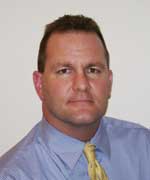
Dan Stowers
Dan Stowers joined GEMA in August of 2007 and became the Planning Section Director in April of 2008. He came to GEMA after serving as the Deputy Director for Chatham Emergency Management Agency in Savannah, Georgia for nine years and Assistant Fire Chief for the City of Pooler. Prior to entering his public safety career, Dan served ten years in the U.S. Army Judge Advocate General’s Corps, with assignments worldwide to include Operations Desert Shield and Desert Storm.
While serving as the Deputy Director for Chatham County, Dan held numerous titles and filled many challenging roles. In 1999 he was designated as the evacuation coordinator for Chatham County and spearheaded the general population evacuation of Savannah and Chatham County for Hurricane Floyd, which at the time was the largest evacuation in U.S. History. In 2003, Dan was appointed as the lead planner for Chatham County and oversaw planning efforts for the 2004 G8 Summit, a Level I National Special Security Event.
Dan’s military and public service experience includes key planning and operational leadership positions in large-scale responses to hazardous material incidents, mass evacuations, residential and commercial structure fires and high level criminal investigations. Dan operated an administrative logistical operations center for Desert Shield and combat operations in Iraq during Desert Storm in 1991.
Dan holds a Bachelor of Science Degree in Criminal Justice Administration. He has completed numerous programs at the National Fire Academy and Emergency Management Institute in Emmitsburg, Maryland. Dan has served as an assessor for the Emergency Management Accreditation Program and completed assessments of numerous emergency management programs. As an Incident Command System instructor, Dan has been asked to teach ICS courses for municipal government and non-government organizations all over the United States. His enthusiasm in the classroom, broad experience in emergency management and natural desire to help organizations prepare and respond to all types of disasters, have made him a popular outside instructor to assist organizations in implementing the principles of the National Incident Management System.
Dan was raised in Derry, New Hampshire. He is married to Nichole Stowers, formerly of Seymour, Indiana. They have two sons and one daughter. They reside in Henry County, Georgia and are actively engaged in supporting youth athletic and church programs with their children.
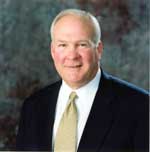
Bert Thornton
The first Waffle House restaurant opened in 1955 and now the company consists of over 1500 restaurants. Each restaurant is open 24 hours a day, 365 days a year, inspiring urban myths such as “Waffle House doors have no locks”. Since 1955, Waffle House has served almost 500 million waffles, and each year Waffle House serves enough grits to fill over 86 semi-trucks. The company focuses on people (associates and customers), with a corporate culture well-known for its commitment to employees at all levels.
In 2005, Waffle House was named one of the top four companies in the disaster response area for their decades of service to customers after hurricanes and other crises. In many cases Waffle House is the only restaurant open for victims and responders alike. Bert Thornton has said, "Nothing good can come from a closed Waffle House after a hurricane – not for us, not for the community, not for the associates."
In 1971, Bert Thornton joined Waffle House as a dishwasher/busboy after serving with the US Army in Vietnam and as a systems analyst and salesman in NCR’s IT division. Four years later, Bert became a Vice President. Over the past 37 years, Bert Thornton has worked with both Company and Franchise Operations in Waffle House. In 2004, Bert was named President and Chief Operations Officer and in 2008 became President of Franchise Operations. In the course of his duties over the years, Bert has planned and led the Waffle House, Inc. hurricane response campaign for every hurricane since Hugo impacted Charleston, SC in 1989. He has also assisted affected coastal area Waffle House franchisees in their preparation and response efforts. Bert is from Tampa, Florida, and graduated from Georgia Tech with a degree in Industrial Management in 1968.

Rolando Tomasini
Rolando Tomasini is Research Group Leader at the INSEAD Social Innovation Center's Humanitarian Research Group
He joined INSEAD in 2002 to do work with Prof Luk Van Wassenhove on humanitarian logistics and humanitarian private partnership (Corporate Social Responsibility and Public Private Partnerships). Together they established the Humanitarian Research Group with offices in Fontainebleau (France) and Abu Dhabi (UAE). He currently oversees projects in the area of disaster preparedness, response coordination, partnerships, fleet management and access to healthcare.
Through numerous secondments (UN Joint Logistics Center, Dubai Humanitarian City, UN High Commissioner for Refugees), research and consulting projects with different humanitarian organisations in the field and head offices, he has produced several award wining case studies with INSEAD, managerial and academic articles (The Conference Board), reports and lectures on the subject.
His material is widely used for teaching at business schools globally. He lectures in different events at INSEAD, participates widely at the INSEAD Executive Education Program "Management in the Humanitarian Sector", and lectures graduate students at the Copenhagen Business School.
Most recently he is co-authored with Professor Van Wassenhove a book by Palgrave on "Humanitarian Logistics."

Santosh Vempala
Santosh Vempala is Distinguished Professor of Computer Science and Director
of the Algorithms and Randomness Center (ARC) at Georgia Tech. His research
interests are in algorithms, randomness and geometry and their applications.
He graduated from CMU in 1997, advised by Avrim Blum and was at MIT until
2006 except for a year as a Miller Fellow at UC Berkeley. His book, "The
Random Projection Method," was published in 2004 and another on "Spectral
Algorithms" (with Ravi Kannan) is nearing completion. Vempala is a Sloan
Fellow and a Guggenheim Fellow, and continues to get unreasonably excited
when a phenomenon that appears complex from one perspective turns out to be
simple from another. Since 2007, he has been studying how computers can
create sustainable societal benefits. He co-taught "Computing for Good" in
2008 and has four ongoing projects in this space: a scalable blood
monitoring system for developing countries, a homeless housing occupancy
system for Atlanta, a partnership with Operation P.E.A.C.E., an after school
program in the old fourth ward, and a promising new protocol for mobile
wireless networks.

Prashant Yadav
Prashant Yadav is a professor of supply chain management at the MIT-Zaragoza International Logistics Program and a research affiliate at the MIT Center for Transportation and Logistics. Prashant has been involved in numerous research and consulting engagements in the area of supply chain management for medicines in sub-Saharan Africa. He is a consultant and advisor to the Bill & Melinda Gates Foundation, the World Bank, the UK Department for International Development, the Rockefeller Foundation, the Center for Global Development, the World Health Organization, the Ministry of Health of Zambia, Dalberg Global Development Advisors and many other organizations in the area of access to medicines. A large part of his work involves analytical, empirical and case studies of supply chains in low and middle income countries. His service responsibilities in this area include: member,Access and Delivery Advisory Board of the Medicines for Malaria Venture, Chair, Roll-Back Malaria Partnership's Forecasting Task Force, Advisory Committee Member-Supply Chain, ACT Watch project. Prashant is the author of many scientific publications and his work has been featured in prominent media such as the Economist and the BBC.
Prior to academia, Prashant has worked in the industry in pharmaceutical strategy, supply chain design and operations planning. Prashant's academic training includes a Bachelor's Degree in Chemical Engineering from the Indian Institute of Technology, MBA from the FORE School of Management and a PhD in Management Science from the University of Alabama. He now resides mostly in Zaragoza, Spain.